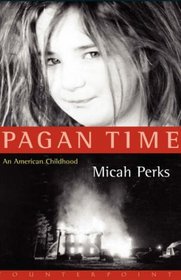Helpful Score: 2
"Sometimes it seems like I've spent my life searching for the words that will open my childhood for you. It's always the same - even as I'm trying to use my story to knock down the wall between us, I can see myself turning into a freak, my childhood a sideshow."
Thus Micah Perks begins the story of her struggle to make comprehensible her unorthodox childhoodnat her family'scommune in the Adirondack wilderness. At the core of her book lie memories of her wildly eccentric father, a self-proclaimed pagan intent on demolishing conventional bundaries and morality. With little more than a run-down jeep and their newborn baby in tow, Perks' parents set out in 1963 to build a school and utopian community in the mountains. Their school quickly became known as a place to send teens with drug addictions and serious emotional problems - children Micha and her younger sister would grow up with. Their mother was a passionately moral young woman from Brooklyn: their father, a colorblind artist, a British bohemian who delighted in surprise and trickery and adventure; a man who thought nothing of dividing the commune in half and waging a simulated war or of setting everyone out on the ocean in leaky rowboats.
This complex memoir combines a moving celebration of the utopian spirit and its desire for community and freedom with a lacerating crutique of the consequences of those desires - consequences especially felt by the children.
Thus Micah Perks begins the story of her struggle to make comprehensible her unorthodox childhoodnat her family'scommune in the Adirondack wilderness. At the core of her book lie memories of her wildly eccentric father, a self-proclaimed pagan intent on demolishing conventional bundaries and morality. With little more than a run-down jeep and their newborn baby in tow, Perks' parents set out in 1963 to build a school and utopian community in the mountains. Their school quickly became known as a place to send teens with drug addictions and serious emotional problems - children Micha and her younger sister would grow up with. Their mother was a passionately moral young woman from Brooklyn: their father, a colorblind artist, a British bohemian who delighted in surprise and trickery and adventure; a man who thought nothing of dividing the commune in half and waging a simulated war or of setting everyone out on the ocean in leaky rowboats.
This complex memoir combines a moving celebration of the utopian spirit and its desire for community and freedom with a lacerating crutique of the consequences of those desires - consequences especially felt by the children.




